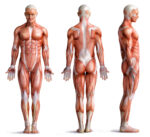FDA Grants Fast Track Status to Edgewise’s EDG-5506 for BMD
Written by |

garagestock/Shutterstock
The U.S. Food and Drug Administration (FDA) has granted fast track status to EDG-5506, Edgewise Therapeutics’ investigational oral therapy for Becker muscular dystrophy (BMD).
This designation is given to experimental treatments that are intended to treat serious conditions and fill an unmet medical need. It confers certain benefits, like more frequent meetings with the FDA during the development process, with the aim of expediting the review of much-needed medicines.
EDG-5506 was designed to protect muscle cells from damage caused by daily use. By doing so, the therapy aims to preserve muscle function over time.
“The FDA’s decision to grant EDG-5506 Fast Track designation underscores the urgency to address a significant unmet medical need for individuals with Becker muscular dystrophy,” Kevin Koch, PhD, president and CEO of Edgewise, said in a press release.
“We look forward to working closely with the FDA towards establishing EDG-5506 as the potential first muscle-directed therapy for individuals with Becker,” added Koch, noting that people with this form of muscular dystrophy usually experience “loss of ambulation and heart disease that has substantial impact on day-to-day function.”
Edgewise is developing EDG-5506 for both BMD and Duchenne muscular dystrophy (DMD), as well as limb-girdle muscular dystrophy (LGMD).
Late last year, the company received nearly $100 million in funding to advance the investigational treatment.
BMD and DMD — both of which usually affect boys — are caused by mutations in the gene that codes for the dystrophin protein. Normally, the dystrophin protein helps to protect muscle cells from getting damaged as they go through the rigorous processes of contracting and relaxing during movement. In people with muscular dystrophies, however, muscle cells are abnormally susceptible to this day-to-day stress, ultimately resulting in progressive muscle deterioration over time.
According to Edgewise, the investigational therapy may benefit a broad range of patients with rare neuromuscular disorders, as it could be used both as a single therapy and in combination with other available treatments.
The FDA’s decision to put EDG-5506 on the fast track for BMD was based on preclinical data, in which EDG-5506 showed promise in animal models, as well as on data from an ongoing Phase 1 clinical trial (NCT04585464).
That trial, sponsored by the company, is assessing the safety and tolerability of EDG-5506, first in healthy volunteers, then in people with BMD. Participants are being given one or multiple doses of the investigational medication, with or without food, and monitored for safety outcomes and to assess pharmacokinetics (how the compound moves into, through, and out of the body).
The clinical trial is actively recruiting up to 152 adults, ages 18 to 55, at a single study site in San Antonio, Texas. Results are expected later this year, according to Edgewise.
BMD occurs in approximately 1 in every 18,450 live male births, Edgewise notes. There are an estimated 4,000–5,000 individuals living with BMD in the U.S.







